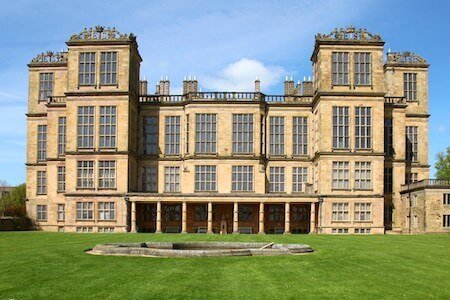It was interesting to learn about the etymology of “Daylight Robbery”- it really prompted me to dig deeper.
When William III was short of money, which he attempted to rectify by the introduction of the much-despised Window Tax. As the name suggests, this was a tax levied on the windows or window-like openings of a property. The details were much amended over time, but the tax was levied originally on all dwellings except cottages. The upper classes, having the largest houses, paid the most. Some wealthy individuals used their ability to pay as a mark of status and demonstrated their wealth by ostentatiously building homes with many windows.

What the Cavendish family, who owned Hardwick Hall (built 1590s), thought about it isn’t recorded. On the one hand, they had cause for complaint – the property was famous for its many windows and light and airy interiors, as celebrated in the rhyme: “Hardwick Hall, more glass than wall”. On the other hand, they were extremely rich and well able to pay.
Taxes are rarely popular, but the Window Tax, which was considered to tax the very stuff of life, that is, light and air, was singled out for particular loathing. People went to great pains to avoid paying it and many windows were bricked up for that reason. Many examples of buildings with brick window panels, sometimes with painted-on trompe l’oeil windows, still survive.

The sight of such windows is so much part of the English architectural folk memory that the example pictured, of a recently built property in Poundbury, Dorset, appears to have been built with fake bricked-up windows, even through the tax itself is long since abolished.
So, that’s the case for the prosecution: the English were robbed of their daylight by the Window Tax. That’s daylight robbery in anyone’s book, so do we need to look any further for the origin of the phrase? Well, yes we do.
Let’s move to the 20th century for the case for the defence. The phrase isn’t known in print until 1916 in Hobson’s Choice, a comic play by Harold Brighouse. Even there the context doesn’t explicitly link it to unfair overcharging or the like. We have to wait until 1949 for a citation that is clearly related to a purchase, in Daniel Marcus Davin’s Roads from Home:
“I can never afford it, said his sister. It’s daylight robbery.”
So, Daylight robbery aka Window Tax.
https://www.phrases.org.uk/meanings/daylight-robbery.html
What Was the Window Tax?
The ‘Window Tax’ was a tax devised by King William III in the 1690s. It was levied on the windows or openings of a building.
The more windows a building had, the more tax they paid. It was essentially a progressive tax whereby the wealthier member of society paid the most as they tended to have larger houses and more windows on those houses.
Indeed, many rich individuals took paying the tax as a badge of honour. The greater tax they paid meant that they were seen as having more wealth and status. In fact, some houses were built with more windows for that specific purpose.
